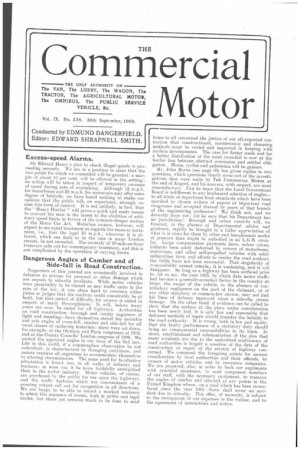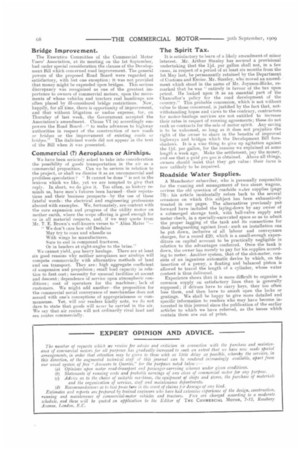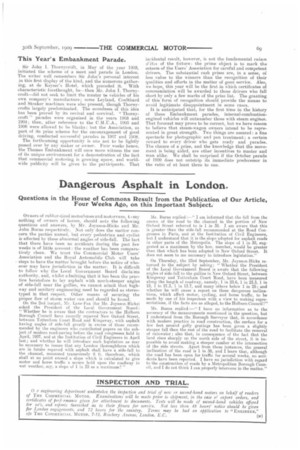Excess-speed Alarms.
Page 1

Page 2

Page 3

If you've noticed an error in this article please click here to report it so we can fix it.
Sir Edward Henry's plan to check illegal speeds is proceeding serenely. We are in a position to state that the two points for which we contended will be granted: a margin of about 10 per cent, will he allowed in the setting ; no action will be taken in respect of temporary excesses of speed during acts of overtaking. Although 13 m.p.h. for motorbuses and 22 m.p.h. for motorcabs may offer some degree of latitude, we have heard nothing to shake our opinion that the public will, on experience, strongly resent this form of control. It is not unlikely, in fact, that the " Henry Howler " will prove a quick and ready means to convert the man in the street to the abolition of arbitrary speed limits in favour of the common-danger section of the Motor Car Act. Motorbus owners, however, will expect to see equal treatment as regards the tramcar maximum, i.e., that the legal 16 m.p.h., wherever it is allowed, which one finds to be the case in many London streets, be not exceeded. The anomaly of 20-mile-an-hour tramcars calls out for contemporary treatment, and this is not complicated by the operation of varying limits.
Dangerous Angles of Camber and of Side-fall in Road Construction.
Supporters of this journal are occasionally involved in defences to actions for personal or other damage which are sequels to side-slip incidents. While motor vehicles were permissibly to be classed as new traffic units in the eyes of the law, it was often hard to convince either juries or judges that the roadway could conceivably be at fault, but that period of difficulty for owners is ended in respect of many thoroughfares. It will, before many years are over, he ended for all highways. Authorities on road constructionborough and county engineers of light and standing—have themselves stated the desirable and safe angles of cross-fall, camber and side-fall for all usual classes of surfacing materials: these were set down, for example, at the Olympia and Paris congresses of 1908, and at the County Councils' London congress of 1909. We quoted the approved angles in our issue of the 2nd inst. Life in this world, if a commonplace observation he not redundant, is characterized by changing conditions, and nature requires all organisms to accommodate themselves to altering circumstances. The same need for facultative adaptation is found. too, in all walks of industry and business; in none can it be more faithfully exemplified than in the motor industry. Motor vehicles, of course, are purchased by the public for use upon the highways, and the traffic features which are concomitants of a growing output yell out for recognition in all directions. We are happy to be able to record a marked tendency to admit this sequence of events, both in public and legal circles, but there yet remains much to he done to send
home to all concerned the jitstice of our oft-repeated contention that constructional, maintenance and cleansing methods must be varied and improved in keeping with modern developments. The case for flatter roads and fora better distribution of the total cross-fall is now at the border line between abstract concession and settled obligation. Horse, cyclist and pedestrian will be gainers.
Mr. John Burns (see page 69) has given replies to two questions, which questions clearly arose out of the investigations that were made by THE COMMERCIAL MOTOR at the end of August, and his answers, with respect, are most unsatisfactory. Can he mean that the Local Government. Board is indifferent to any haphazard selection of angles— to all kinds of departures from standards which have been specified by chosen writers of papers at important road congresses and accepted thereat by peers of that branch of the engineering profession ? We think not, and we devoutly hope not ; yet he says that his Department has no jurisdiction! Borough and urban councils will, we forecast, in the absence of Departmental advice and guidance, rapidly be brought to a fuller appreciation of' what is in store for them by other and less-pleasant modes of pressure than might be embodied in an L.G.B. circular. Large compensation payments have, mlens Talens,. hitherto been solely disbursed by owners of motorbuses, motorvans, and other self-propelled vehicles with solidindiarubber tires, and efforts to render the road authorities liable have not been successful. That singularity of rosponsibility cannot remain ; it is weakening, and it will disuppear. So long as a highway has been surfaced prior' to, let us say, the year 1903, by which date motor traffichad become a generally-accepted factor in the country at large, the owner of the vehicle, in the absence of contributory negligence on the part of the claimant, or of any other statutory or common-law answer, may not find his lines of defence improved when a side-slip causes• damage. On the other hand, if evidence can be called to show that the surface at the place under consideration has been newly laid, it is only fair and reasonable that deficient methods of repair should transfer the liability to. the road authority. It is wrong, both in law and equity. that the faulty performance of a statutory duty should bring no consequential responsibilities in its train. In short, establishment and substantiation of the plea that many accidents are due to the undoubted misfeasance of road authorities is largely a question of the date of the construction or repair of the stretch of highway concerned_ We commend the foregoing points for serious consideration by local authorities and their officials, by owners of motor vehicles, and by insurance companies. We are prepared, also, in order to back our arguments with practical assistance, to send competent members of our staff, with the necessary equipment., to measure the angles of camber and side-fall at any points in the United Kingdom where—on a road which has been re-surfaced since the year 1904—there shall occur an accident due to side-slip. This offer, of necessity, is subject to the recoupment of our expenses in the matter, and to the agreement of instructions and notice.
Bridge Improvement.
The Executive Committee of the Commercial Motor Users' Association, at its meeting on the 1st September, had under special consideration the clauses of the Development Bill which concerned road improvement. The general powers of the proposed Road Board were regarded as satisfactory, with but one exception : it was not provided that money might be expended upon bridges. This serious discrepancy was recognized as one of the greatest importance to owners of commercial motors, upon the movements of whose vehicles and tractors real handicaps are often placed by ill-considered bridge restrictions. Now, happily, for all time, there is opportunity of improvement, and that without litigation or undue expense, for, on Thursday of last week, the Government accepted the Association's amendment. Clause VI (a) accordingly empowers the Road Board—" to make advances to highway authorities in respect of the construction of new roads or bridges or the improvement of existing roads or bridges." The italicized words did not appear in the text of the Bill when it was presented.
Commercial (?) Aeroplanes or Airships.
\Are have been seriously asked to take into consideration the possibility of goods transportation in the air as a commercial proposition. Can we he serious in relation to the project, or shall we dismiss it as an uncommercial and profitless speculation ;' It cannot be done '' is not in the lexicon which we like, yet we are tempted to give that reply. In short, we do give it. Too often, as history reminas us, have men's futures been harmed—their reputations and their business prospects--by the use of these fateful words : the electrical and engineering professions abound with examples. We, fortunately, are content with the sure expansion and progress of the utility motor on mother earth, where the scope offering is good enough for us in all material respects, and, if we may quote from Mr. T. E. Brown's well-known verses to "Alma Mater "— " We don't care how old Daedalus May try to coax and wheedle us With wings he manufactures.
Sure to end in compound fractures, Or in headers at right-angles to the brine."
We cannot yield, qua heavy haulage. There are at least six good reasons why neither aeroplanes nor airships will compete commercially with alternative methods of land and sea transport. they are : high aggregate coefficient of suspension and propulsion ; small load capacity in relation to first cost ; necessity for unusual facilities at ascent and descent ; dependence of service upon atmospheric, conditions; cost of operators for the machines lack of customers. We might add another—the proposition for the commercial aerial conveyance of merchandise does not accord with one's conceptions of appropriateness or commonsense. Yet, will our readers kindly note, we do not dare to state that goods will never be carried in the air. We say that air routes will not ordinarily rival land and sea routes commercially.
The Spirit Tax.
It is satisfactory to learn of a likely amendment of minor interest. Mr. Arthur Stanley has secured a provisional undertaking that the lid. per gallon shall not, in a few cases, in respect of a, period of at least six months from the 1st May last, be permanently retained by the Department of Customs and Excise. Mr. Stanley, who moved an amendment which stood in the name of Mr. Joynson-Hicks, remarked that he was " entirely in favour of the tax upon petrol. He looked upon it as an essential part of the Chancellor's policy for the road development of the country." This probable concession, which is not without value to those concerned, is justified by the fact that, notwithstanding hopes and views to the contrary, contractors for motor-haulage services are not entitled to increase their rates in respect of running agreements; these do not rank as contracts for the sale of motor spirit. Any saving is to be welcomed, so long as it does not prejudice the right of the owner to share in the benefits of improved highways and bridges which the Development Bill foreshadows. It is a wise thing to give up agitation against the LK per gallon, for the reasons we explained at some length a week ago. Make the settlement, pay the money, and see that a quid pro quo is obtained. Above all things, owners should insist that they get value : their locus is now unlikely to be impaired.
Roadside Water Supplies.
A Manchester subscriber, who is personally responsible for the running and management of two steam wagons, revives the old question of roadside water supplies (page 7): his article incidentally refers hack to the several occasions on which this subject has been exhaustively treated in our pages. The alternatives previously put forward have included the laying-down by any owner of a submerged storage tank, with ball-valve supply and meter check, in a specially-excavated space so as to admit the proper lagging of the tank and its connections for their safeguarding against frost: such an installation can be put down, inclusive of all labour and conveyance charges, for a round £20, which is a small-enough expenditure on capital account to be practically negligible in relation to the advantages conferred. Once the tank is down, the owner has merely to pay for his supplies according to meter. Another system, that of the slot-meter, consists of an ingenious automatic device by which, on the insertion of a penny, a floating and balanced piston is allowed to travel the length of a cylinder, whose water content is thus delivered.
Experience shows that it is more difficult to organize a common supply on satisfactory lines than is generally supposed ; if drivers have to carry keys, they too often lose them, and then have to smash open the locks or gratings. We shall be happy to give more detailed and specific information to readers who may have become interested in this journal since the publication of the earlier articles to which we have referred, as the issues which contain them are out of print.
This Year's Embankment Parade.
Sir John I. Thornycreft, in May of the year 1903, initiated the scheme of a meet and parade in London. The writer well remembers Sir John's personal interest in this first display of the kind, and the numerous gathering, at de Keyser's Hotel, which preceded it. With characteristic forethought, he—then Mr. John I. Thornycroft—did not seek to limit the muster to vehicles of his own company's manufacture; some Leyland, Coulthard and Straker machines were also present, though Thornycrofts largely predominated. The soundness of this idea has been proved by its revival and survival. " Thornycroft " parades were organized in the years 1903 and 1904; then, after reference to the C.M.U.A., 1905 and 1906 were allowed to be blanks: but the Association, as part of its prize scheme for the encouragement of good driving, conducted successful parades in 1907 and 1908.
The forthcoming opportunity is one not to be lightly passed over by any maker or owner. Four weeks hence, the Thames Embankment will once more witness the use of its unique environment for a demonstration of the fact that commercial motoring is growing apace, and worldwide publicity will be given to the participants. That
inridental result, however, is not the fundamental raison d'etee of the fixture: the prime object is to mark the esteem of the Users' Association for careful and competent drivers. The substantial cash prizes are, in a sense, of less value to the winners than the recognition of their qualities and efforts in the matter of good service. Also, we hope, this year will be the first in which certificates of commendation will be awarded to those drivers who fall short by only a few marks of the prize list. The granting of this form of recognition should provide the means to avoid legitimate disappointment in some cases.
It is anticipated that, for the first time in the history of these Embankment parades, internal-combustionengined vehicles will outnumber those with steam engines. That forecast may prove to be correct, but we have reason to believe that steam-wagon owners intend to be represented in great strength. Two things are assured: a fine spectacle for photographic and pen treatment; a certain reward to every driver who gets ready and parades. The chance of a prize, and the knowledge that the movement is being aided, are other incentives to master and man alike: We shall be surprised if the October parade of 1909 does not outstrip its immediate predecessor in the ratio of at least three to one.






















